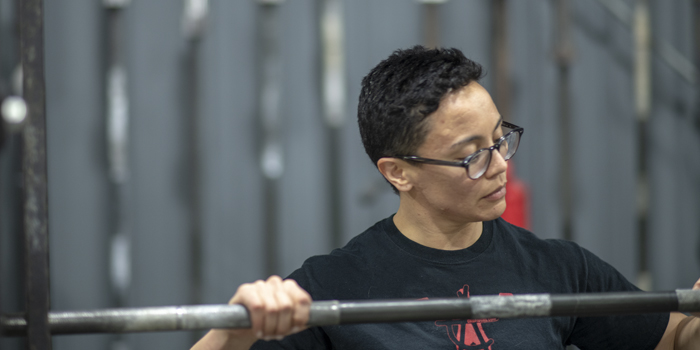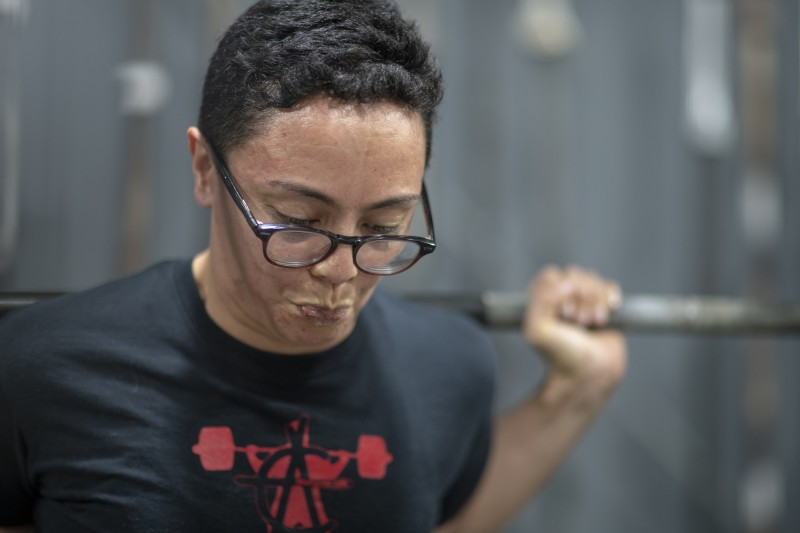
When you first begin strength training, like most endeavors in life, motivation is through the roof. Training is exciting, productive, gratifying, and the vast majority of the time it rewards you with almost immediate results. We all remember the first year or two of training and how training builds momentum like an avalanche. The training adaptations of being a beginner mean frequent PRs and lots of accompanying excitement. During this time, it isn’t difficult to be motivated for training, because you know that right on the other side of the gym door is likely another PR just waiting for you.
Then something happens. As a few years go by and you transition from a beginner to an intermediate lifter, the PRs aren’t so frequent. Instead of being “right on the other side of the gym door”, PRs are tucked away down some long hallways with twists and turns along the way. As you progress as a lifter, strength becomes less and less linear, and the peaks and valleys of training get bigger. As this transition happens, most lifters start to lose motivation, and the excitement and reward of training starts to fade. Suddenly you aren’t guaranteed to PR at a meet, and you don’t have a weekly PR to post on social media. Training becomes less of a highlight reel, and the aches and pains suddenly start being a little more pronounced.
RECENT: Using Values and Strengths to Help You Determine Your Career Path
This is where many lifters quit training and/or competing. This is unfortunate because, in this transition to an intermediate (and eventually advanced) lifter, you learn some of the most important lessons about training and getting stronger — lessons ranging from technique and program methodology to lessons like perseverance and toughness. If you can continue to stick with training through this process, you will find yourself in a much smaller group than you started with as a beginner, but it will be good company to be in. One thing that is worth mentioning is that when I discuss beginner, intermediate, or advanced lifters, I am referring to training age (how long you have been training), and not strength level. I think many beginners (lifters in their first one to two years of training) that find themselves at a high strength level compared to their peers start to perceive themselves as advanced lifters. Even if your strength is at a higher level, I think training age still is a good thing to keep in mind. Tricking yourself into thinking you are an advanced lifter a year or two in will only further discourage you when obstacles show up — and social media makes it easy to do this.
So how do you continue to progress as a lifter when life gets tougher, progress is slower, and motivation is lacking? This is where discipline is the constant. Discipline doesn't rely on the same variables that motivation, excitement, or interest do. Discipline can be maintained when all the other pieces of training aren’t going well, or aren’t as easy as when you first started. This value of discipline also carries over into every area of life beyond training, and I think you’ll find that practicing discipline in training will positively affect your ability to be disciplined in other areas of your life.
As I was working on this article and thought more over this topic, I decided to split the concept of discipline into three separate areas. These three disciplines are all things that can be done no matter what life throws at you, and will help persevere towards your goals even when life takes its shots at you.
Discipline of Habit
Building daily and weekly habits is crucial to success in any area of life. When motivation and energy inevitably come and go, habits can stay consistent and keep you on the right path. I was listening to Joe Rogan on his podcast, the Joe Rogan Experience, and he was discussing discipline as it relates to his training. He said something along the lines of (I’m paraphrasing), “Training doesn’t get easier. If anything it gets harder. I don’t want to train all the time, but I don’t sit and think about how much I want to brush my teeth in the morning either. I just brush my teeth, and I do it every day because it’s what I do. I train every week because it’s what I do.”
Developing training into a habit will allow you to keep progressing even when the training session itself isn’t gratifying. If your training is fueled by motivation, when progress slows you won’t want to train. But if training is a habit in your weekly routine, you will persist through those times. I discussed this concept of “discipline over motivation” with Jim Wendler on my Podcast, and the value of this cannot be stated enough. The discipline of habit is crucial not only for training in general but for the specific components of training as well. If you have determined that a certain amount of mobility work is important to staying healthy, you have to build that into a habit. The same goes for things like getting to bed on time to get enough sleep so you can recover from training. Make sure that you are earning the fun parts of training by disciplining yourself to do the mundane work week in and week out.
Discipline of Emotions
I think that one of the most valuable and under-appreciated skills for getting stronger is being able to emotionally disconnect yourself from training. As I mentioned earlier, training progress isn’t linear, and there are constant ups and downs in performance the longer you train. We’ve all seen lifters who allow themselves to make poor decisions on the up-swing of performance, and then mentally destroy themselves and panic when they experience the down-swing.
Allowing day-to-day, week-to-week, and even month-to-month performance to influence you emotionally is a recipe for discouragement, pride, and a host of other unhelpful roadblocks to success. Part of discipline is knowing your plan, knowing that things don’t always go according to plan, and riding the waves of performance as they come. We’re all human and emotions will always be part of training (and can be a helpful tool), but you must discipline yourself to detach from the peaks and valleys. That is where the skill of mindfulness can be a great asset to you as a lifter. Being able to have something happen in training, take a deep breath, and say, “Okay, time to move forward” is a priceless skill to develop.
Discipline of Gratitude
Discipline and gratitude may not seem like they are closely related, but each year that passes in my life I see how much they are. Being thankful is not a natural emotion, and we all know how much easier it is to vent or complain about a situation than it is to be thankful for it. Especially when our expectations are set at constant PRs, immediate gratification, and quick progress as a beginner, it's hard to turn around learn to be thankful for a five-pound PR.
This is another skill of discipline that will serve you in great ways as you develop it. Taking time every day to recognize what there is to be thankful for, even in the worst of situations, will build strength both physically and mentally. Being thankful for small PRs, for having the ability to train, and for the ability to learn lessons and gain knowledge during injury is an unnatural skill to develop, but it is one that we have to discipline ourselves to focus on. A practical way to implement this on a daily basis is picking a time of day and making it a habit to vocalize or write down three to five things that you are thankful for. I have been working on doing this in the mornings while I take a shower, and it provides a much clearer and grounded perspective as I approach my day. For me, I vocalize the things I’m thankful for in a short prayer, and it has the ability to literally turn around my attitude for the day.
These three disciplines are not easy. They don’t come to us naturally, and they take time. We’re all human and struggle, and it’s important to have patience with ourselves as we grow and develop. I encourage you to take these three disciplines and start working on them every single day, and observe how they affect not only training but the rest of your life as well. The process of getting strong(er) isn’t easy, but the rewards of persevering are priceless.












Learning to be grateful is perhaps the best thing you can do in life. Worry dissolves. Complaints dissolve. Comparisons dissolve. Disappointment dissolves. Unmet expectations dissolve. But it is like muscle. You have to train it to be stronger. I once had a coach tell me to "fake it til you make it." He was talking about something inconsequential like putting effort into stretching or sitting without talking or something. He would follow it up with "who knows, you might accidentally learn something." On the surface it sounds shallow and maybe even a little deceiving. But what I now understand as an adult and knowing his background more, he was talking about discipline. Motivation is for the moment and fluctuates, discipline is for the long haul.
Thanks
I'm not sure I understand the comment about Jim, but I do know there's a lot I can glean from different people, even if they have a different style than I do or believe different things. Multiple perspectives are always good to have.